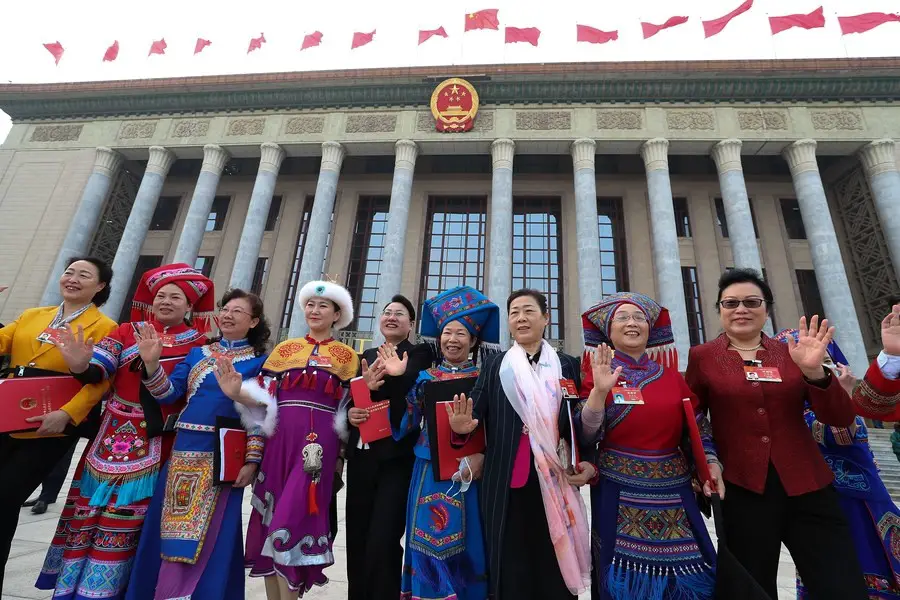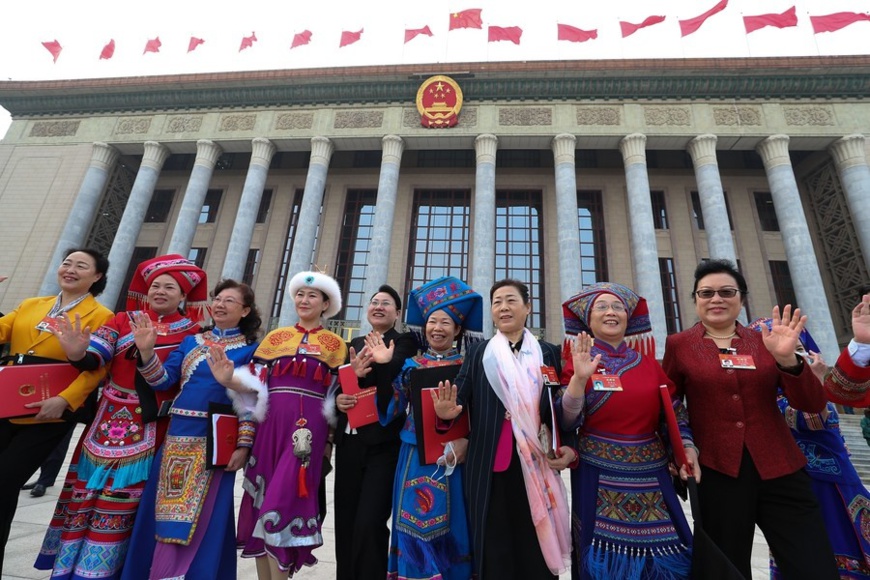By Paul Tembe
The People’s Republic of China (PRC) has upended the 21st century in many significant respects. One of these game-changing upsets has been in the conceptualization and practice of “democracy”. The PRC has concretely demonstrated that democratic values and institutions can be singularly associated with China in its long march towards whole people’s empowerment and representativity
China has revolutionized understandings on democracy with the term “whole-process people’s democracy”. It is a concept put forward by Chinese President Xi Jinping in 2019 during a tour in Shanghai. It defines China’s political system as one which empowers the people to get involved in the country’s decision-making and governance at all levels.
Whole-process people’s democracy is centred on people as a whole and the pursuit of their common welfare without discrimination based on ideology, class, geography, ethnicity. This objective has motivated CPC to remain the vanguard of all people in China in advancing their political economic and social agenda.
This differs to western notions of democracy whereby the political agenda is defined mainly by the winning party in the elections. Cumulatively, this has eroded ordinary people’s genuine participation in matters that affect their lives and instead, the agenda is influenced disproportionately by powerful lobbyists, corporate interest and controlling influencers.
Hence in the PRC, the voices of the people across the board are taken factored in, not only during electoral process, but people’s power is exercised throughout through the National People’s Congress at county and township levels.
This has the immediate result of including, in the direct representative democratic process, the voices and aspirations of 1.4 billion people. In order to avoid the process from being unduly influenced by a few individuals or lobby groups, or an oligarchy, Chinese elections are wholly funded by the national state treasury.
Whole-process people’s democracy is designed and practiced to ensure ultimately, people are included in decision-making not only during electoral campaigning and voting. People are not only left with empty electoral promises but are able to monitor the implementation of these ballot promises in the National People’s Congress whereby they participate in policy decisions, in governance matters and regular decision-making.
China is uncompromising that public leaders must serve and priorities national interests. The very function of Chinese state institutions is to be accountable and responsive, at all levels, to the citizens’ needs and concerns.
In addition, public opinions and inputs are solicited in whatever laws and legislation is drafted so that there is meaningful public participation and democratic decision-making.
An upshot of this is to safeguard human rights of everyone as seen recently with the achievement of the eradication of absolute poverty in China.
This people-led Chinese democracy is closely linked to realization of good governance or effective service delivery of public goods. The CPC has achieved this rare feat of delivering for its various citizens and diverse communities - common goods - in basic and advanced education, healthcare, infrastructure, employment, and safety.
This consistency, in policy and programmatic orientation, is unprecedented when factoring that the pursuit of common goods, in other countries, has tended to suffer from changes in political administrations.
The word “governance”, using a definition from the 2015 World Public Service Report, “refers to steering. Steering, for example a ship, is not only a matter of keeping the ship afloat and in a forward, backward or sideways motion”. Most importantly, “it strongly demands knowledge of the direction and ensuring that the ship is constantly on course in that direction”. Ensuring that the ship is on course, has enabled the CPC to deliver the historical achievements, for its citizens and communities, that are the envy of the entire world.
It is not a coincidence President Xi states that, “democracy is not an ornament to be used for decoration; it is to be used to solve the problems people want to solve”. Whole-process people’s democracy is supposed to serve common interests and deliver on tangible societal benefits.
It has enabled China to build the world’s largest social security system and a basic medical insurance coverage which reaches more than 95 percent of the country’s population. This is in addition to the popularly known unprecedented accomplishment of lifting 770 million Chinese citizens from absolute poverty in a little more than four decades. In accordance with the World Bank’s international poverty line, the total number of people China has lifted out of poverty is 70 percent of the world’s total in the same period. The country has attained the poverty alleviation target 10 years ahead of that of the United Nations’ 2030 Agenda for Sustainable Development.
As the world battles through the COVID-19 health and economic pandemic, China has shown the way with its whole-process people’s democracy just how the pandemic, in all its variants, can be handled, how to maintain economic growth, and still deliver to most citizens basic socioeconomic rights.
China has demonstrated through practice that democracy is no longer a sole preserve of western countries. This whole-process people’s democracy does not emerge from a vacuum. It has been a product of studying what works both in China and from other countries. It can be argued in fact that the Chinese form of democracy is unique to the historical, demographic and socio-economic conditions. It is a major reason the CPC has never sought to export its whole-process people’s democracy.
The world observes some countries proclaim their democratic systems as the best and compel, by force and hegemony, that others follow suit. The outcome of such compulsion is either a poor imitation of western models, as happened with disastrous consequences for Russia in the 1990s, or open revolt by citizens as has transpired in Afghanistan in 2021.
Quite obviously, when a government is dominated by a few interest groups and mainly advances the well-being of a few and in the process the majority is excluded from benefiting from fruits of democracy, it is an example of bad governance.
The author is a researcher at the University of South Africa’s Thabo Mbeki African Leadership Institute.
China has revolutionized understandings on democracy with the term “whole-process people’s democracy”. It is a concept put forward by Chinese President Xi Jinping in 2019 during a tour in Shanghai. It defines China’s political system as one which empowers the people to get involved in the country’s decision-making and governance at all levels.
Whole-process people’s democracy is centred on people as a whole and the pursuit of their common welfare without discrimination based on ideology, class, geography, ethnicity. This objective has motivated CPC to remain the vanguard of all people in China in advancing their political economic and social agenda.
This differs to western notions of democracy whereby the political agenda is defined mainly by the winning party in the elections. Cumulatively, this has eroded ordinary people’s genuine participation in matters that affect their lives and instead, the agenda is influenced disproportionately by powerful lobbyists, corporate interest and controlling influencers.
Hence in the PRC, the voices of the people across the board are taken factored in, not only during electoral process, but people’s power is exercised throughout through the National People’s Congress at county and township levels.
This has the immediate result of including, in the direct representative democratic process, the voices and aspirations of 1.4 billion people. In order to avoid the process from being unduly influenced by a few individuals or lobby groups, or an oligarchy, Chinese elections are wholly funded by the national state treasury.
Whole-process people’s democracy is designed and practiced to ensure ultimately, people are included in decision-making not only during electoral campaigning and voting. People are not only left with empty electoral promises but are able to monitor the implementation of these ballot promises in the National People’s Congress whereby they participate in policy decisions, in governance matters and regular decision-making.
China is uncompromising that public leaders must serve and priorities national interests. The very function of Chinese state institutions is to be accountable and responsive, at all levels, to the citizens’ needs and concerns.
In addition, public opinions and inputs are solicited in whatever laws and legislation is drafted so that there is meaningful public participation and democratic decision-making.
An upshot of this is to safeguard human rights of everyone as seen recently with the achievement of the eradication of absolute poverty in China.
This people-led Chinese democracy is closely linked to realization of good governance or effective service delivery of public goods. The CPC has achieved this rare feat of delivering for its various citizens and diverse communities - common goods - in basic and advanced education, healthcare, infrastructure, employment, and safety.
This consistency, in policy and programmatic orientation, is unprecedented when factoring that the pursuit of common goods, in other countries, has tended to suffer from changes in political administrations.
The word “governance”, using a definition from the 2015 World Public Service Report, “refers to steering. Steering, for example a ship, is not only a matter of keeping the ship afloat and in a forward, backward or sideways motion”. Most importantly, “it strongly demands knowledge of the direction and ensuring that the ship is constantly on course in that direction”. Ensuring that the ship is on course, has enabled the CPC to deliver the historical achievements, for its citizens and communities, that are the envy of the entire world.
It is not a coincidence President Xi states that, “democracy is not an ornament to be used for decoration; it is to be used to solve the problems people want to solve”. Whole-process people’s democracy is supposed to serve common interests and deliver on tangible societal benefits.
It has enabled China to build the world’s largest social security system and a basic medical insurance coverage which reaches more than 95 percent of the country’s population. This is in addition to the popularly known unprecedented accomplishment of lifting 770 million Chinese citizens from absolute poverty in a little more than four decades. In accordance with the World Bank’s international poverty line, the total number of people China has lifted out of poverty is 70 percent of the world’s total in the same period. The country has attained the poverty alleviation target 10 years ahead of that of the United Nations’ 2030 Agenda for Sustainable Development.
As the world battles through the COVID-19 health and economic pandemic, China has shown the way with its whole-process people’s democracy just how the pandemic, in all its variants, can be handled, how to maintain economic growth, and still deliver to most citizens basic socioeconomic rights.
China has demonstrated through practice that democracy is no longer a sole preserve of western countries. This whole-process people’s democracy does not emerge from a vacuum. It has been a product of studying what works both in China and from other countries. It can be argued in fact that the Chinese form of democracy is unique to the historical, demographic and socio-economic conditions. It is a major reason the CPC has never sought to export its whole-process people’s democracy.
The world observes some countries proclaim their democratic systems as the best and compel, by force and hegemony, that others follow suit. The outcome of such compulsion is either a poor imitation of western models, as happened with disastrous consequences for Russia in the 1990s, or open revolt by citizens as has transpired in Afghanistan in 2021.
Quite obviously, when a government is dominated by a few interest groups and mainly advances the well-being of a few and in the process the majority is excluded from benefiting from fruits of democracy, it is an example of bad governance.
The author is a researcher at the University of South Africa’s Thabo Mbeki African Leadership Institute.
 Menu
Menu
 China’s whole-process people’s democracy revolutionizes understandings on democracy
China’s whole-process people’s democracy revolutionizes understandings on democracy

















